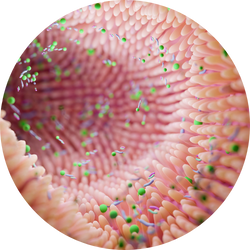What In The World Is Leaky Gut Syndrome?
Leaky gut syndrome is a condition that’s gaining increasing attention in the world of holistic health, and for good reason. Though still not fully recognized by conventional medicine, many functional medicine practitioners and researchers believe that a compromised gut barrier plays a significant role in chronic inflammation, autoimmune disorders, and digestive issues.
If you’ve been dealing with bloating, brain fog, food sensitivities, or even unexplained fatigue, your gut health might be at the root. In this blog post, we’ll explore what leaky gut syndrome is, what causes it, how to spot the symptoms, and most importantly: How you can begin healing your gut naturally through diet and lifestyle changes.
What Is Leaky Gut Syndrome?
Leaky gut syndrome, also referred to as increased intestinal permeability, occurs when the lining of your small intestine becomes compromised. Think of your intestinal lining as a security system. It’s designed to let in beneficial nutrients while keeping harmful invaders like toxins, pathogens, and undigested food particles out of your bloodstream.
When the tight junctions of your gut lining loosen, that security system starts to break down. This “leaky” barrier allows unwanted substances to escape into the bloodstream, where they trigger inflammation and immune system responses. Over time, this chronic low-grade inflammation can contribute to a wide range of health issues: From digestive discomfort to autoimmune diseases.
Common Causes of Leaky Gut
Several everyday factors can weaken the gut lining and lead to leaky gut syndrome. These include:
Poor Diet: A diet high in processed foods, refined sugar, gluten, alcohol, and industrial seed oils can irritate and inflame the gut lining.
Chronic Stress: Elevated cortisol levels over time can impair digestion, reduce blood flow to the intestines, and increase intestinal permeability.
Overuse of Medications: Non-steroidal anti-inflammatory drugs (NSAIDs), antibiotics, and acid reducers can damage the mucosal barrier and alter the gut microbiome.
Gut Dysbiosis: An imbalance of beneficial and harmful gut bacteria can weaken the integrity of the intestinal wall.
Environmental Toxins: Pesticides, heavy metals, plastics, and pollutants are all potential contributors to leaky gut.
Infections: Chronic viral, bacterial, or parasitic infections may inflame the gut and impair its function.
Signs and Symptoms of Leaky Gut
Leaky gut can be a silent disruptor of health for many people. Symptoms often overlap with other conditions, making it difficult to diagnose without proper testing. Common signs include:
Bloating, gas, or abdominal cramps
Food sensitivities or intolerances that seem to develop over time
Brain fog, memory issues, or trouble concentrating
Fatigue that isn’t resolved with rest
Skin conditions like acne, eczema, or rashes
Joint pain, stiffness, or muscle aches
Mood disorders including anxiety or depression
Autoimmune conditions such as Hashimoto’s thyroiditis, rheumatoid arthritis, lupus, or celiac disease
If you’re experiencing several of these symptoms, it’s worth exploring your gut health with a qualified holistic or functional medicine provider.
How to Heal Leaky Gut Naturally
Healing leaky gut isn’t about finding a quick fix. It’s about creating a sustainable, long-term strategy that supports your body’s natural ability to repair and restore balance. Below are the key steps to healing leaky gut naturally.
1. Remove Gut Irritants
The first step in healing is removing foods and substances that trigger inflammation or damage the gut lining. Common culprits include:
Gluten (especially from modern wheat sources)
Conventional dairy
Refined sugars and artificial sweeteners
Alcohol and excess caffeine
Processed and packaged foods with additives, preservatives, or hydrogenated oils
Eliminating these for 4–6 weeks (or longer, depending on symptoms) can make a noticeable difference in how you feel.
2. Eat Gut-Healing Foods
Once irritants are removed, focus on adding in nutrient-dense, anti-inflammatory foods that help rebuild the gut lining:
Bone Broth: Rich in collagen, gelatin, and amino acids like glutamine that repair and soothe the intestinal wall.
Fermented Foods: Sauerkraut, kimchi, kefir, and yogurt (from organic or non-dairy sources) help repopulate the gut with good bacteria.
High-Fiber Foods: Vegetables, fruits, legumes, and whole grains (if tolerated) support healthy digestion and feed beneficial microbes.
Healthy Fats: Omega-3s from salmon, chia seeds, and walnuts, as well as fats from coconut oil, avocado, and olive oil, can reduce inflammation and promote tissue healing.
3. Support with Targeted Supplements
While food is foundational, certain supplements can help speed up the healing process when used correctly:
L-Glutamine: An amino acid that fuels intestinal cells and helps repair the gut lining.
Zinc Carnosine: Supports the integrity of the mucosal barrier and promotes tissue repair.
Probiotics: High-quality, multi-strain probiotics restore balance to your microbiome and reduce pathogenic bacteria.
Digestive Enzymes: These help break down food more effectively, reducing the chance of undigested particles irritating the gut.
Always consult a practitioner before starting new supplements, especially if you have a chronic health condition.
4. Reduce Chronic Stress
Chronic stress is one of the most overlooked causes of gut dysfunction. Implement stress-reducing practices into your daily routine, such as:
Deep breathing exercises
Gentle yoga or walking in nature
Journaling or therapy
Mindfulness or meditation apps
Spending time with loved ones or engaging in creative hobbies
Remember, healing requires your nervous system to feel safe. Create an environment that supports calm and restoration.
5. Prioritize Quality Sleep
Your gut does much of its repair work while you sleep. Aim for 7–9 hours of restful sleep each night. You can improve your sleep hygiene by:
Keeping a consistent sleep schedule
Avoiding screens 1–2 hours before bed
Using calming rituals like herbal tea, magnesium, or a warm bath
Sleeping in a cool, dark, quiet environment
Additional Holistic Lifestyle Tips
Hydrate: Water supports digestion and detoxification. Add lemon or trace minerals for extra support.
Move Your Body: Light, consistent movement supports healthy digestion and lymphatic drainage.
Avoid Smoking and Excess Alcohol: Both compromise the gut lining and increase inflammation.
Consider Functional Testing: Working with a practitioner can help identify hidden infections, food sensitivities, or microbiome imbalances contributing to leaky gut.
Final Thoughts: Healing Your Gut is Possible
Leaky gut syndrome can be the root of many health issues, but with mindful changes to your diet, lifestyle, and mindset, you can begin to restore your gut and improve your overall well-being. Healing the gut is a journey, and it starts with awareness and consistent, supportive actions.
Have you been on a gut-healing journey? Share your experience or questions in the comments below!
To your healing,






